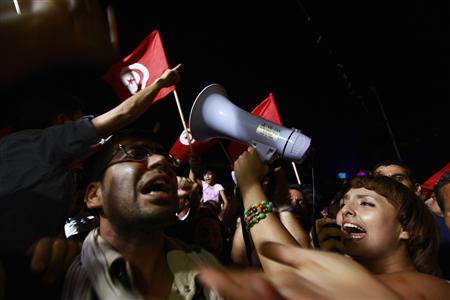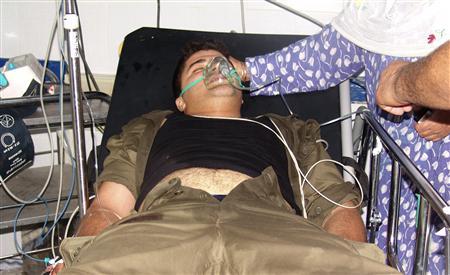www.aljazeerah.info
News, July 2013
Archives
Mission & Name
Conflict Terminology
Editorials
Gaza Holocaust
Gulf War
Isdood
Islam
News
News Photos
Opinion Editorials
US Foreign Policy (Dr. El-Najjar's Articles)
www.aljazeerah.info
|
Editorial Note: The following news reports are summaries from original sources. They may also include corrections of Arabic names and political terminology. Comments are in parentheses. |
Tunisians Continue Protests, Minister Resigns, Following Assassination of Mohamed Brahmi
July 31, 2013
 |
 |
 |
 |
Tunisian minister resigns as pressure grows on government
Wednesday, July 31, 2013, 9:21 am EDT
TUNIS (Reuters) -
Tunisian Education Minister Salem Labyedh has resigned, the prime minister's spokesman said on Wednesday, as pressure mounts on the Islamist-led government to step down amid a growing political crisis.
Last week's killing of a leftist politician, the second to be slain by suspected Islamist militants in six months, is disrupting a tense political transition that began when Tunisians toppled an autocratic leader in 2011.
Opposition parties, the largest labor union and the secular Ettakatol party, the ruling Islamist Ennahda party's junior coalition partner, have all demanded the government's departure.
Labyedh, a secular independent, had said he was considering resigning after fellow-leftist Mohamed Brahmi was shot dead on Thursday in an assassination the government has pinned on hardline Salafi Islamists. The opposition blames Ennahda.
The opposition is also calling for the dissolution of the transitional Constituent Assembly, just weeks before the elected body completes a new draft constitution.
Ennahda has softened its rejection of opposition demands, saying it was open to the possibility of a new government, but has firmly rejected demands to disband the Assembly.
(Reporting by Tarek Amara and Erika Solomon; Editing by Alistair Lyon)
Tunisia's biggest union tells Islamist-led government to quit
By Tarek Amara
Tuesday, July 30, 2013, 12:59 pm EDT
TUNIS (Reuters) -
Tunisia's largest labor union called on Tuesday for the dissolution of the Islamist-led government and the interior minister offered to resign as a political crisis deepened.
Softening its rejection of demands for the government's departure, the Islamist Ennahda party said it was ready for a new government, but opposed any move to disband an elected body that has almost completed work on a new draft constitution.
"We are open to all proposals to reach an agreement, including a salvation or unity government," Ennahda official Ameur Larayedh told Reuters. "But we will not accept dissolving the Constituent Assembly. This is a red line."
Protests against the moderate Islamist Ennahda party surged after last week's killing of a leftist politician, the second to be slain in six months, disrupting a tense political transition that began when Tunisians toppled an autocratic leader in 2011.
While politicians feud, the army is struggling to contain Islamist militants, who killed eight soldiers on Monday in a mountainous region near the Algerian border in one of the bloodiest attacks on Tunisian troops in decades.
The powerful Tunisian General Labor Union (UGTT), which has about 600,000 members in the public and private sectors, said a technocratic government should replace the one led by Ennahda.
"We consider this government incapable of continuing its work," Hussein Abbassi, head of the UGTT, said in a statement.
While endorsing demands for the government to fall, the UGTT has also opposed dissolving the assembly - a measure which would throw Tunisia's fragile transition process into limbo.
COALITION IN DISARRAY
"We propose maintaining the Constituent Assembly but ... with a time-frame to speed up completion of its work," said Abbassi, general secretary of the UGTT, which brought much of the country to a halt with a one-day strike on Friday.
The secular opposition, energized by the overthrow of Egypt's freely elected Islamist president this month, has stepped up pressure on the Ennahda-led government to quit.
Some opposition leaders were dissatisfied with Ennahda's offer to form a new government but keep the Assembly in place.
"The street wants to dissolve the Constituent Assembly, which is already dying politically and ethically. Its legitimacy is over," said Mongi Rahoui, a leader in the Popular Front.
Opposition leaders criticize the Assembly for far exceeding the one-year deadline it set in December 2011 to complete its tasks, which include drafting a constitution.
Rahoui also said Ennahda must relinquish the post of prime minister in any deal on a new government.
The ruling coalition headed by Prime Minister Ali Larayedh has begun to fray in the last few days as political turmoil and street unrest grip the North African nation of 11 million.
Interior Minister Lotfi Ben Jeddou, a judge and political independent from the al-Qasreen area near where the troops were ambushed by militants, said he was keen to stand down.
"I am ready to resign," he told the local Mosaique radio station. "A salvation government or national unity government must be formed to get Tunisia out of this bottleneck."
On Monday, the secular Ettakatol party threatened to withdraw from the ruling coalition unless a unity government was formed to defuse widespread and often violent protests.
Ennahda, which won elections after President Zine al-Abidine Ben Ali was overthrown in the first of a series of Arab uprisings, has resisted demands to give up power.
The opposition, angered by the assassination of leftist leaders Chokri Belaid in February and Mohamed Brahmi on Thursday, has rejected several concessions and power-sharing proposals from the Ennahda-led coalition in the last few days.
(Additional reporting by Erika Solomon; Editing by Alistair Lyon)
Gunmen kill eight Tunisian troops as political tensions grow
By Tarek Amara and Erika Solomon
Mon Jul 29, 2013 8:01pm EDT
TUNIS (Reuters) -
Gunmen killed at least eight Tunisian soldiers on Monday, staging the biggest attack on the security forces in decades as political tensions rose between supporters and opponents of the Islamist-led government.
President Moncef Marzouki called the ambush on Mount Chaambi, near the Algerian border, a "terrorist attack" and announced three days of mourning. Tunisian troops have been trying to track down Islamist militants in the remote region since December.
Tunisians fear they may be sliding into one of the worst crises in their political transition since autocratic leader Zine al-Abidine Ben Ali was forced to flee during a 2011 uprising that set off revolts across the Middle East.
"In all countries of the world, when the state faces a terrorist attack people come together. But I don't see anything like that happening in Tunisia. All we see is divisions and chaos," Marzouki said in a televised address.
"I call on all politicians at this historic moment to stand for the nation and unite."
Residents said that thousands took to the streets in the town of al-Qasreen, near the site of the attack on the army, and many protesters were demanding the government's ouster.
In the capital, Tunis, more than 10,000 took to the streets as well in one of the biggest protests since the opposition began mobilizing against the government.
"Tunisia is free, out with terrorism, out with Ghannouchi," protesters shouted, referring to Rached Ghannouchi, leader of the Ennahda party.
"Since they (Ennahda) came all we've seen is a string of catastrophes," said protester Noura Saleh, who was waving a red Tunisian flag and crying. "Get out, we hate you!"
SOLDIERS MUTILATED
State television cut off normal programming to show pictures of the dead soldiers and wounded comrades, broadcasting Quranic verses and patriotic anthems in the background.
"After the soldiers were ambushed and shot dead, their throats were slit and their clothes were ripped," a military source told Reuters.
"After that, three soldiers pursuing the attackers were wounded when a landmine exploded."
Instability has been rising amid growing political chaos. Last week, Tunis was hit by its first-ever car bomb, though no one was hurt.
The secular Ettakatol party, a junior partner of the moderate Islamist Ennahda, called on the ruling party to step down to stave off more turmoil. It said a new administration representing a wider consensus was necessary.
"If Ennahda rejects this proposal, we will withdraw from the government," Lobni Jribi, a party leader, told Reuters.
Prime Minister Ali Larayedh ignored the calls to create a unity government and said he would carry on leading the country.
Protests aimed at ousting the government intensified last week after the second assassination of a secular opposition politician in six months.
The government blamed hardline Salafist militants for both attacks, but the opposition holds Ennahda responsible. It argues that the leadership has not done enough to investigate and crack down on militant attacks.
Despite previous unrest, Tunisia had been a model for democratic transition among the "Arab Spring" states. But divisions are growing between government backers and the opposition, which has been emboldened by the Egyptian army's ousting of elected President Mohamed Mursi and subsequent crackdown on his supporters.
Ennahda supporters are determined to avoid a similar fate.
The opposition may be able to mobilize Tunisians further against the government after Monday's ambush, which shocked the country and increased anti-government sentiment on social media.
UNIONS MULL STRIKE
Many people joining the growing street protests express anger at Tunisia's instability and economic stagnation. Others are frustrated that the constitution, originally promised within one year after the 2011 uprising, has yet to be completed and are suspicious of the transitional government.
This week the opposition rejected all concessions and efforts at reconciliation by Ennahda and said it was planning to create its own rival "salvation government."
Tunisia's powerful General Union of Tunisian Workers was in talks with the opposition on Monday. It said it was considering a strike, a move that would paralyze much of the country.
Larayedh struck a note of defiance in a speech on Monday, calling the opposition protesters "coupists." He also challenged his critics to act constructively.
"We are open to all kinds of dialogue with all sides," he said. "Any specific proposals to increase the effectiveness of the government, bring them forward."
A Constituent Assembly is only weeks away from completing a long-delayed draft constitution to be put to a referendum.
The secular opposition has called for the 217-member Assembly to be dissolved. In the last few days, more than 70 lawmakers have left the body and set up a sit-in protest outside its headquarters.
(Reporting by Tarek Amara and Erika Solomon; Writing by Erika Solomon; Editing by David Stamp and Eric Beech)
Fair Use Notice
This site contains copyrighted material the
use of which has not always been specifically authorized by the copyright
owner. We are making such material available in our efforts to advance
understanding of environmental, political, human rights, economic,
democracy, scientific, and social justice issues, etc. We believe this
constitutes a 'fair use' of any such copyrighted material as provided for
in section 107 of the US Copyright Law. In accordance with Title 17 U.S.C.
Section 107, the material on this site is
distributed without profit to those
who have expressed a prior interest in receiving the included information
for research and educational purposes. For more information go to: http://www.law.cornell.edu/uscode/17/107.shtml.
If you wish to use copyrighted material from this site for purposes of
your own that go beyond 'fair use', you must obtain permission from the
copyright owner.
|
|
|
|
||
|
||||||


